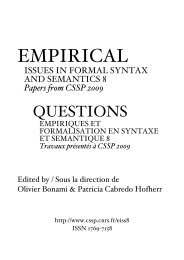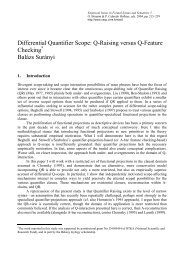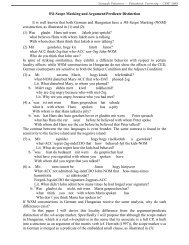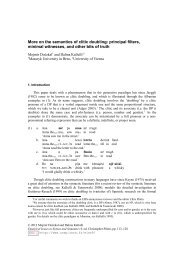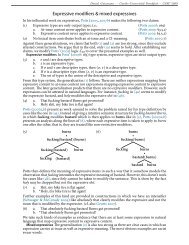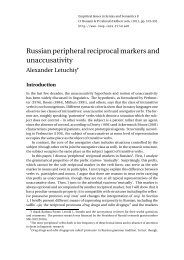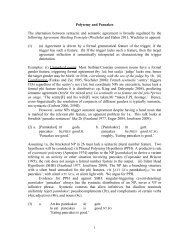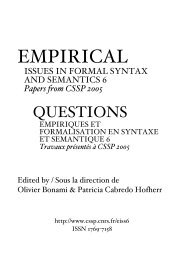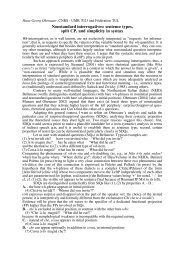Empirical Issues in Syntax and Semantics 9 (EISS 9 ... - CSSP - CNRS
Empirical Issues in Syntax and Semantics 9 (EISS 9 ... - CSSP - CNRS
Empirical Issues in Syntax and Semantics 9 (EISS 9 ... - CSSP - CNRS
Create successful ePaper yourself
Turn your PDF publications into a flip-book with our unique Google optimized e-Paper software.
their <strong>in</strong>terpretation requires a comparison between situations which differentiates this class<br />
from the predicates of judgment with an <strong>in</strong>dicative complement (class (ii)). This is essentially<br />
the proposal <strong>in</strong> Villalta 2008 (see also Leeman 1994). We differ from Villalta <strong>in</strong> simplify<strong>in</strong>g the<br />
process of comparison. Instead of hav<strong>in</strong>g sets of alternative situations (or possible worlds) that<br />
are ranked accord<strong>in</strong>g to their conformity to the description <strong>in</strong> the complement clause, we<br />
propose that it is sufficient to contrast p versus non-p.<br />
Causatives are a different matter. One could say that negative causatives (empêcher<br />
‘prevent’, éviter ‘avoid’, s’opposer à ce que ‘to be opposed’), because they <strong>in</strong>clude a negation,<br />
are like the negative predicates of communication <strong>and</strong> judgment (class (vi-c)): they compare p<br />
<strong>and</strong> non-p. The agent acts <strong>in</strong> such a way that a possible situation (described by the p<br />
complement) does not get realized (this corresponds to non-p). This is not <strong>in</strong>accurate, but does<br />
not cover the positive ones. In fact, causatives resemble predicates of will <strong>and</strong> desire. Certa<strong>in</strong>ly,<br />
they are action verbs rather than attitudes. But predicates such as faire que ‘make it so that’,<br />
s’arranger pour que ‘manage’, or chercher à ce que ‘act so that’ describe a change of state:<br />
they are transitional, that is, they describe a process whose end is a change of situations,<br />
start<strong>in</strong>g with a situation described by non-p, <strong>and</strong> end<strong>in</strong>g with a situation described by p. Of<br />
course, negative causatives do not describe the effectuation of a change, but their <strong>in</strong>terpretation<br />
requires tak<strong>in</strong>g such a change <strong>in</strong> consideration.<br />
The last difficulty is raised by modals describ<strong>in</strong>g circumstantial necessity, such as il est<br />
nécessaire ‘it is necessary’ <strong>in</strong> (25). Such uses of modals describe how th<strong>in</strong>gs are, <strong>and</strong> could not<br />
be otherwise. Modals of circumstantial necessity contrast clearly with the habituals <strong>in</strong> the<br />
miscellaneous class (viii), which either <strong>in</strong>dicate that a situation holds sometimes but not always<br />
(il arrive que ‘it may be the case’) or are transitional (s’habituer à ce que ‘get used to’, être<br />
habitué à ce que ‘be used to’): gett<strong>in</strong>g used to or be<strong>in</strong>g used to a certa<strong>in</strong> situation implies a<br />
period when this was not the case. One could suggest that modals of circumstantial necessity<br />
take <strong>in</strong>to account both p <strong>and</strong> non-p <strong>in</strong> that they are broadly equivalent to ‘not possible that nonp’.<br />
(25) a. Il est nécessaire que la somme des angles d’un triangle {fasse SUBJ / *fait IND } 180°.<br />
It is necessary that the sum of the angles of a triangle amount to 180°<br />
b. Il est nécessaire que le médec<strong>in</strong> soit arrivé puisque sa voiture est dans la cour.<br />
It is necessary that the doctor is arrived, s<strong>in</strong>ce his car is <strong>in</strong> the yard<br />
However, such reason<strong>in</strong>g seems rather fragile: there is no pr<strong>in</strong>cipled limit to its application.<br />
Why should an expression such as ‘th<strong>in</strong>k that p’ not be equivalent to ‘not th<strong>in</strong>k that non-p’? The<br />
relevant question is different, <strong>and</strong> shifts the analysis from semantics to pragmatics. We must ask<br />
what br<strong>in</strong>gs a speaker to say il est nécessaire que p rather than simply say p. That is, the<br />
speaker could have said (26) <strong>in</strong>stead of (25).<br />
(26) a. La somme des angles d’un triangle fait 180°.<br />
The sum of the angles of a triangle amounts to 180°<br />
b. Le médec<strong>in</strong> est arrivé puisque sa voiture est dans la cour.<br />
The doctor is arrived, s<strong>in</strong>ce his car is <strong>in</strong> the yard<br />
Sentences <strong>in</strong> (25) <strong>and</strong> (26) refer to exactly the same situations. Thus, the difference does<br />
not concern reference: it is a matter of <strong>in</strong>teraction. Beh<strong>in</strong>d the assertions <strong>in</strong> (25) there is a<br />
deduction: (25a) can be used as a step towards a conclusion, for <strong>in</strong>stance to show to a child<br />
where his demonstration fails, <strong>and</strong> (25b) is not appropriate except as an argument used to<br />
conv<strong>in</strong>ce a discourse participant of the reality of the situation; <strong>in</strong> this respect, its argumentative<br />
137



